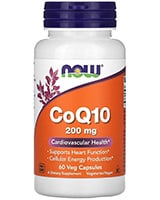

Introduction
Coenzyme Q10 (CoQ10) is a vital nutrient, naturally synthesized in the human body and plays a pivotal role in our overall health. As we age, the levels of CoQ10 in our body diminish, which can impact various aspects of our health, from energy levels to cardiovascular health. This article delves into the seven key reasons why supplementing with CoQ10 could be a significant game-changer for maintaining health and vitality.
Reason 1: Enhanced Cardiovascular Health
CoQ10 is crucial for heart health. It aids in the proper functioning of the heart muscles and is beneficial in managing heart failure conditions[1]Alarcón-Vieco, E., Martínez-García, I., Sequí-Domínguez, I., Rodríguez-Gutiérrez, E., Moreno-Herráiz, N., & Pascual-Morena, C. (2023). Effect of coenzyme Q10 on cardiac function and survival in heart failure: An overview of systematic reviews and meta-analyses. Food & Function, 14(14), 6302-6311. https://doi.org/10.1039/d3fo01255g. By improving energy production in heart cells, it helps the heart to pump blood more efficiently. Additionally, CoQ10 has been linked to lower blood pressure levels, thereby reducing the risk of hypertension and associated cardiovascular diseases[2]Ho, M. J., Li, E. C. K., & Wright, J. M. (2016). Blood pressure lowering efficacy of coenzyme Q10 for primary hypertension. Cochrane Database of Systematic Reviews, 2016(3), CD007435. https://doi.org/10.1002/14651858.CD007435.pub3. This makes CoQ10 an essential nutrient for those looking to maintain a healthy heart.
Reason 2: Energy Production and Cognitive Health
A key function of CoQ10 is its role in energy production within the mitochondria, the powerhouse of cells. This is particularly important in brain cells, where a high energy demand is constant. Supplementing with CoQ10 can enhance mental clarity, reduce brain fog, and improve overall cognitive function[3]Fernández-Portero, C., Amián, J. G., de la Bella, R., López-Lluch, G., & Alarcón, D. (2023). Coenzyme Q10 levels associated with cognitive functioning and executive function in older adults. The Journals of Gerontology: Series A, Biological Sciences and Medical Sciences, 78(11). https://doi.org/10.1093/gerona/glac152. As the brain ages, CoQ10 levels naturally decrease, leading to a reduction in mitochondrial efficiency. Therefore, maintaining adequate levels of CoQ10 is vital for sustaining brain health and cognitive abilities over time.
Reason 3: Powerful Antioxidant Defense
CoQ10 is not just a cellular energy booster; it’s also a potent antioxidant. Antioxidants are crucial in protecting our cells from oxidative damage caused by free radicals, and unstable molecules that can harm cell structures. This protection is especially important for preventing neurodegenerative diseases such as Alzheimer’s and Parkinson’s, where oxidative stress plays a key role. By neutralizing free radicals, CoQ10 helps maintain cellular health and longevity, underscoring its role as a defender against age-related degenerative conditions[4]Peixoto de Barcelos, I., & Haas, R. H. (2019). CoQ10 and Aging. Biology (Basel), 8(2), 28. https://doi.org/10.3390/biology8020028.
Reason 4: Blood Sugar and Diabetes Management
The impact of CoQ10 on blood sugar control is significant, particularly for individuals managing diabetes. Research suggests that CoQ10 can aid in maintaining healthy blood sugar levels, primarily by improving insulin sensitivity and regulating glucose metabolism[5]Liang, Y., Zhao, D., Ji, Q., Liu, M., Dai, S., Hou, S., Liu, Z., Mao, Y., Tian, Z., & Yang, Y. (2022). Effects of coenzyme Q10 supplementation on glycemic control: A GRADE-assessed systematic review and dose-response meta-analysis of randomized controlled trials. EClinicalMedicine, 52. https://doi.org/10.1016/j.eclinm.2022.101602. This becomes increasingly important as insulin resistance and inefficient glucose metabolism are common challenges in diabetes management. CoQ10 supplementation, therefore, could be a beneficial adjunct in managing diabetes and preventing related complications.
Reason 5: Anti-aging and Skin Health
CoQ10 plays a critical role in skin health and anti-aging. Its antioxidant properties aid in protecting the skin from harmful ultraviolet rays, thus preventing photoaging. Additionally, CoQ10 helps in reducing the depth of wrinkles and improving skin elasticity[6]Žmitek, K., Pogačnik, T., Mervic, L., Žmitek, J., & Pravst, I. (2017). The effect of dietary intake of coenzyme Q10 on skin parameters and condition: Results of a randomised, placebo-controlled, double-blind study. BioFactors, 43(1), 132-140. https://doi.org/10.1002/biof.1316. By enhancing cellular energy production, it supports the body’s ability to repair skin damage and rejuvenate skin cells, leading to healthier, more youthful-looking skin. This makes CoQ10 a valuable nutrient for those seeking to maintain their skin’s vitality as they age.
Reason 6: Fertility and Reproductive Health
Fertility and reproductive health significantly benefit from CoQ10 supplementation. For women, CoQ10 has been shown to improve egg quality and reverse age-related decline in egg quantity and quality[7]Xu, Y., Nisenblat, V., Lu, C., Li, R., Qiao, J., Zhen, X., & Wang, S. (2018). Pretreatment with coenzyme Q10 improves ovarian response and embryo quality in low-prognosis young women with decreased ovarian reserve: A randomized controlled trial. Reproductive Biology and Endocrinology, 16, 29. https://doi.org/10.1186/s12958-018-0343-0. For men, CoQ10 enhances sperm quality, motility, and concentration, addressing common issues related to male infertility[8]Salvio, G., Cutini, M., Ciarloni, A., Giovannini, L., Perrone, M., & Balercia, G. (2021). Coenzyme Q10 and Male Infertility: A Systematic Review. Antioxidants (Basel), 10(6), 874. https://doi.org/10.3390/antiox10060874. Its role in reducing oxidative stress is particularly beneficial for reproductive health, as oxidative damage can adversely affect both sperm and egg quality. Thus, CoQ10 emerges as a supportive nutrient for couples trying to conceive.
Reason 7: Migraine Reduction
Migraines, often debilitating headaches, can significantly impact quality of life. CoQ10 has shown promise in reducing the frequency of these headaches. Studies suggest that CoQ10 supplementation can decrease the occurrence of migraines, possibly due to its role in improving mitochondrial function and reducing inflammation[9]Shoeibi, A., Olfati, N., Soltani Sabi, M., Salehi, M., Mali, S., & Akbari Oryani, M. (2017). Effectiveness of coenzyme Q10 in prophylactic treatment of migraine headache: An open-label, add-on, controlled trial. Acta Neurologica Belgica, 117(1), 103-109. https://doi.org/10.1007/s13760-016-0697-z. For those suffering from frequent migraines, CoQ10 offers a potential natural remedy to alleviate this chronic condition, emphasizing its multifaceted role in health maintenance.
Conclusion
Coenzyme Q10 is more than just a supplement; it’s a crucial component for various bodily functions and overall well-being. From enhancing heart health and cognitive function to supporting skin health, and fertility, and reducing migraine frequency, CoQ10’s benefits are wide-ranging. As with any supplement, it’s important to consult with healthcare professionals to determine the appropriate dosage and ensure it aligns with individual health needs, especially for those with existing medical conditions or on medications. Incorporating CoQ10 into your wellness routine could be a transformative step towards maintaining health and vitality, especially as you age.
Buy CoQ10 Online Review Comparison Table
| Product | Company | Quantity | Price | Country | Website |
 CoQ10 | iHerb | 60 pills (200mg) | $23.26 |  Worldwide, AU | Visit Website >> |
References
| ↑1 | Alarcón-Vieco, E., Martínez-García, I., Sequí-Domínguez, I., Rodríguez-Gutiérrez, E., Moreno-Herráiz, N., & Pascual-Morena, C. (2023). Effect of coenzyme Q10 on cardiac function and survival in heart failure: An overview of systematic reviews and meta-analyses. Food & Function, 14(14), 6302-6311. https://doi.org/10.1039/d3fo01255g |
|---|---|
| ↑2 | Ho, M. J., Li, E. C. K., & Wright, J. M. (2016). Blood pressure lowering efficacy of coenzyme Q10 for primary hypertension. Cochrane Database of Systematic Reviews, 2016(3), CD007435. https://doi.org/10.1002/14651858.CD007435.pub3 |
| ↑3 | Fernández-Portero, C., Amián, J. G., de la Bella, R., López-Lluch, G., & Alarcón, D. (2023). Coenzyme Q10 levels associated with cognitive functioning and executive function in older adults. The Journals of Gerontology: Series A, Biological Sciences and Medical Sciences, 78(11). https://doi.org/10.1093/gerona/glac152 |
| ↑4 | Peixoto de Barcelos, I., & Haas, R. H. (2019). CoQ10 and Aging. Biology (Basel), 8(2), 28. https://doi.org/10.3390/biology8020028 |
| ↑5 | Liang, Y., Zhao, D., Ji, Q., Liu, M., Dai, S., Hou, S., Liu, Z., Mao, Y., Tian, Z., & Yang, Y. (2022). Effects of coenzyme Q10 supplementation on glycemic control: A GRADE-assessed systematic review and dose-response meta-analysis of randomized controlled trials. EClinicalMedicine, 52. https://doi.org/10.1016/j.eclinm.2022.101602 |
| ↑6 | Žmitek, K., Pogačnik, T., Mervic, L., Žmitek, J., & Pravst, I. (2017). The effect of dietary intake of coenzyme Q10 on skin parameters and condition: Results of a randomised, placebo-controlled, double-blind study. BioFactors, 43(1), 132-140. https://doi.org/10.1002/biof.1316 |
| ↑7 | Xu, Y., Nisenblat, V., Lu, C., Li, R., Qiao, J., Zhen, X., & Wang, S. (2018). Pretreatment with coenzyme Q10 improves ovarian response and embryo quality in low-prognosis young women with decreased ovarian reserve: A randomized controlled trial. Reproductive Biology and Endocrinology, 16, 29. https://doi.org/10.1186/s12958-018-0343-0 |
| ↑8 | Salvio, G., Cutini, M., Ciarloni, A., Giovannini, L., Perrone, M., & Balercia, G. (2021). Coenzyme Q10 and Male Infertility: A Systematic Review. Antioxidants (Basel), 10(6), 874. https://doi.org/10.3390/antiox10060874 |
| ↑9 | Shoeibi, A., Olfati, N., Soltani Sabi, M., Salehi, M., Mali, S., & Akbari Oryani, M. (2017). Effectiveness of coenzyme Q10 in prophylactic treatment of migraine headache: An open-label, add-on, controlled trial. Acta Neurologica Belgica, 117(1), 103-109. https://doi.org/10.1007/s13760-016-0697-z |

Leave a Reply